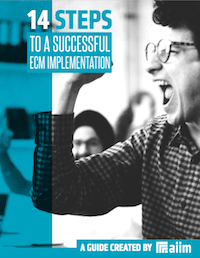The AIIM Blog
Keep your finger on the pulse of Intelligent Information Management with industry news, trends, and best practices.
Information Governance | Sharepoint and Office 365
For millions of Microsoft 365 users, a substantial portion of the organizational knowledge is created, shared, and stored in SharePoint, Exchange email, or OneDrive. Teams offers yet another way to share content with colleagues and even customers, storing files in SharePoint and OneDrive separately. Organizations must oversee this activity across multiple jurisdictions. The information flow is complicated, and the governance implications are substantial.
Share
AIIM on Air | Robotic Process Automation (RPA)
There is a lot of excitement and interest in Robotic Process Automation (RPA) these days, and for good reason. Intelligent automation helps improve flexibility, response and service; all distinguishing capabilities in the age of digital transformation. As a result, business owners and executives from all industries are taking notice. According to one AIIM research study, 55% of organizations plan to implement some form of robotic process automation in the next 6-12 months. Over 80% say they plan on automating over the next 1-2 years.
Share

Making an ECM implementation successful requires planning and attention to detail. The best way to create the right solution is to identify organizational goals and priorities. Learn how to manage a successful implementation in our free guide.
AIIM on Air | Artificial Intelligence (AI)
The notion of Artificial Intelligence has pervaded both the business world and popular culture. And, while Hollywood often portrays AI in a future world of smart robots with super-human characteristics, the truth is that AI technologies are already at work fueling important changes in the way business is conducted every day.
Share
The amount of data organizations must manage today is truly mind-boggling. Research shows that there are 2.5 quintillion bytes of data created each and every day. During the last two years alone 90% of the data in the world was generated. It’s no wonder that many organizations struggle to simply keep pace. And moving mountains of data from older legacy systems to modern cloud-based repositories can seem out of reach for most, regardless of the potential advantages of modernization. But what can you do when you need to migrate? If leaving your data in place is not an option, and moving it makes you lose sleep at night, you can quickly feel overwhelmed by the chaos. Thankfully, there are some new approaches to data migration that may provide an answer. Which is the best approach for your project? Let's take a look at three common approaches to migration to compare them.
Share
AIIM on Air | Digital Transformation
What is the future of work? That’s hard to say. But one thing seems certain: Disruption lies ahead. Driven by innovations in technology, shifting business strategies, and evolving definitions of success, the workplace is changing fast. As the adoption of things like process automation, AI, and Machine Learning continue to accelerate, so will the pace of change in the workplace. Indeed, with the continuing trend toward remote work, many of us may not have a workplace at all. As a result, we must all reconsider how jobs are designed and work to adapt and learn for future growth.
Share
AIIM on Air | Intelligent Information Management (IIM)
The phrase "the art of the possible" can mean different things to different people. For those of us in the information management business, it has come to mean "achieving what we can (possible), rather than what we want (often impossible)." For me, it's an optimistic view of the future rather than a fearful acknowledgment of our challenges and difficulties. The "art" part is where the magic happens; as we allow ourselves to explore the boundaries of what information technology permits us to achieve and how those capabilities move the needle in terms of transformation, innovation, and organizational performance; indeed pushing back those boundaries with a new, more forward-looking approach.
Share